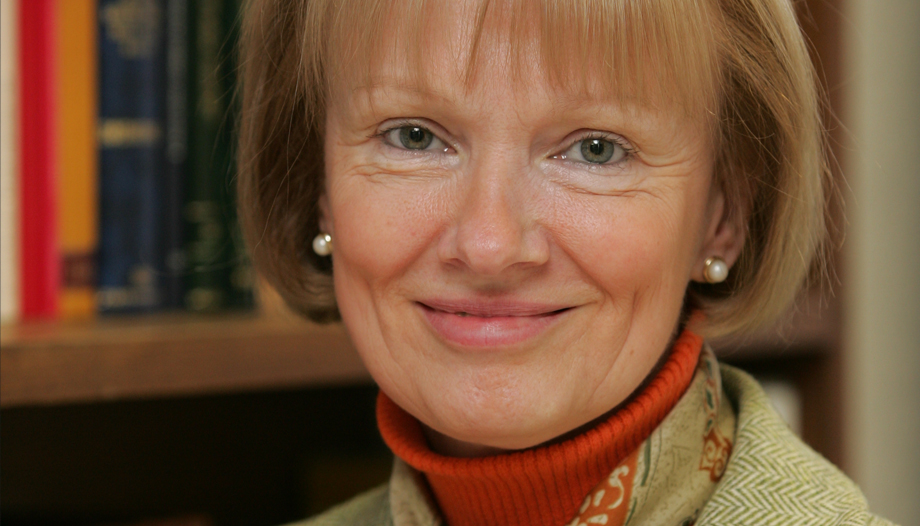November 5 marks the tenth anniversary of the death of Jutta Burggraf, the German theologian whose intelligence and smile illuminated the campus of the University of Navarra for nearly fifteen years, first as a student of Theology and, from 1999, as professor of Dogmatic Theology and Ecumenism. My sister Eulalia had the good fortune to be close to her and has shared her memories with me. I leave the floor to her and add a few comments at the bottom:
"I knew Jutta Burggraf as a fellow doctoral student in the Faculty of Theology at the University of Navarra - she was noted for her intelligence - and as a resident at the Colegio Mayor itself. In spite of her German accent, she spoke perfect Spanish, but - half jokingly, half seriously - she said that she imagined hell as dinner time at the Colegio Mayor, because all the girls spoke at the same time and in Spanish!
I was struck by his personality: he was not moved by custom or common criteria, but he analyzed questions in depth, in conscience, and acted accordingly. Surely because of this, it was evident that he really prayed. When she was before the Blessed Sacrament, she "spoke with God"; she sat peacefully smiling and looking at the tabernacle, like someone enjoying a conversation with a friend.
He had a marked sensitivity towards people who -we would now say- are in a marginal situation. It was not in vain that he had studied special pedagogy before theology. For this reason, when a person had, for example, a disability, he felt a special esteem for him, more along the lines of friendship than compassion.
I had the opportunity to attend many of Jutta's classes or lectures. She broke the mold, as she completely captured the attention through a speech read - with emphasis and frequently raising her smiling gaze - sitting behind a table. Her speech was always profound and understandable: it seemed easy and almost self-evident what she was saying, even if it was not. Her words were always very attractive.
On a couple of occasions he asked me to review a text of his that he was preparing to publish. Although I dared to make some small formal suggestions, I can say that they were excellent texts both in writing and in their structure and content. She worked with great order. She was very conscientious in the work she scheduled in advance - as a good German - and she met the deadlines!
I would like to highlight his work in the field of Ecclesiology and, in particular, Ecumenism. Perhaps the fact of having lived in Germany with people from other Christian communities, led him to have this concern for the unity of the Church very much alive. He gave a very significant title to one of the books he published on ecumenism: Knowing and understanding each other (Rialp, 2003). I also remember that his publication and his lectures on forgiveness helped many people (Learning to forgive, 2008). Finally, I would like to mention his very generous collaboration -many hours of hidden and sacrificial work- in order to bring to light the Dictionary of Theology published by Ediciones Universidad de Navarra in 2006".
So much for the testimony of my sister Eulalia. On December 3, 2011, the Faculty of Theology of the University of Navarra paid a heartfelt tribute to the person who, on the occasion of her death, had been the subject of her testimony. "José Morales, an outstanding representative of the group of women who, after Vatican II, have made theology a central part of their dedication to God and to others in the Church".
Jutta Burggraf has written more than twenty books, more than seventy articles in specialized journals and participated in numerous symposiums and congresses. In May 2009, I coincided with her at a table at the XX Symposium on Church History in Spain and America, held at the Real Alcázar of Seville, under the presidency of Cardinal Carlos Amigo and with the general theme of Identity, pluralism, freedom. I can assure you that the intelligent simplicity of his brilliant presentation and his cordial smile captivated all of us in attendance.
In his theological sketch, Professor Morales pointed out that Jutta Burggraf "He had the conviction that good theology is equivalent to an art of living. [...] He silently understood that theology is not an infused or charismatic science. It presupposes and demands a constant effort, like any truly human task in which body and mind come together to generate, sometimes painfully, an inner effort that transforms reality and the very person who thinks and feels. Theology was for Jutta a service and a necessary ministry that is carried out in the Church, for the Church and the whole of humanity".
In his works he addressed important issues of today's society: the vocation and mission of the laity, the meaning of freedom, the union of Christians, human sexuality, feminism, and many others. His direct reading is a very enriching experience: it is always thought-provoking as well as captivating in its clear-sighted simplicity. When I read his Freedom lived with the strength of faith (Rialp, 4th ed. 2008), I took these three notes that reflect well the personality of the author: "When I am with a loved one, I am happy." (p. 72); "It is better to be wrong than not to think." (p. 113), and "Truth breeds hatred when it hardens or petrifies." (p. 204).
Only ten years have passed since Jutta Burggraf's passing and her writings have as much strength and appeal as when she published them. Jutta, with her gentle smile, was a true frontier thinker who touches the hearts and minds of her readers.







